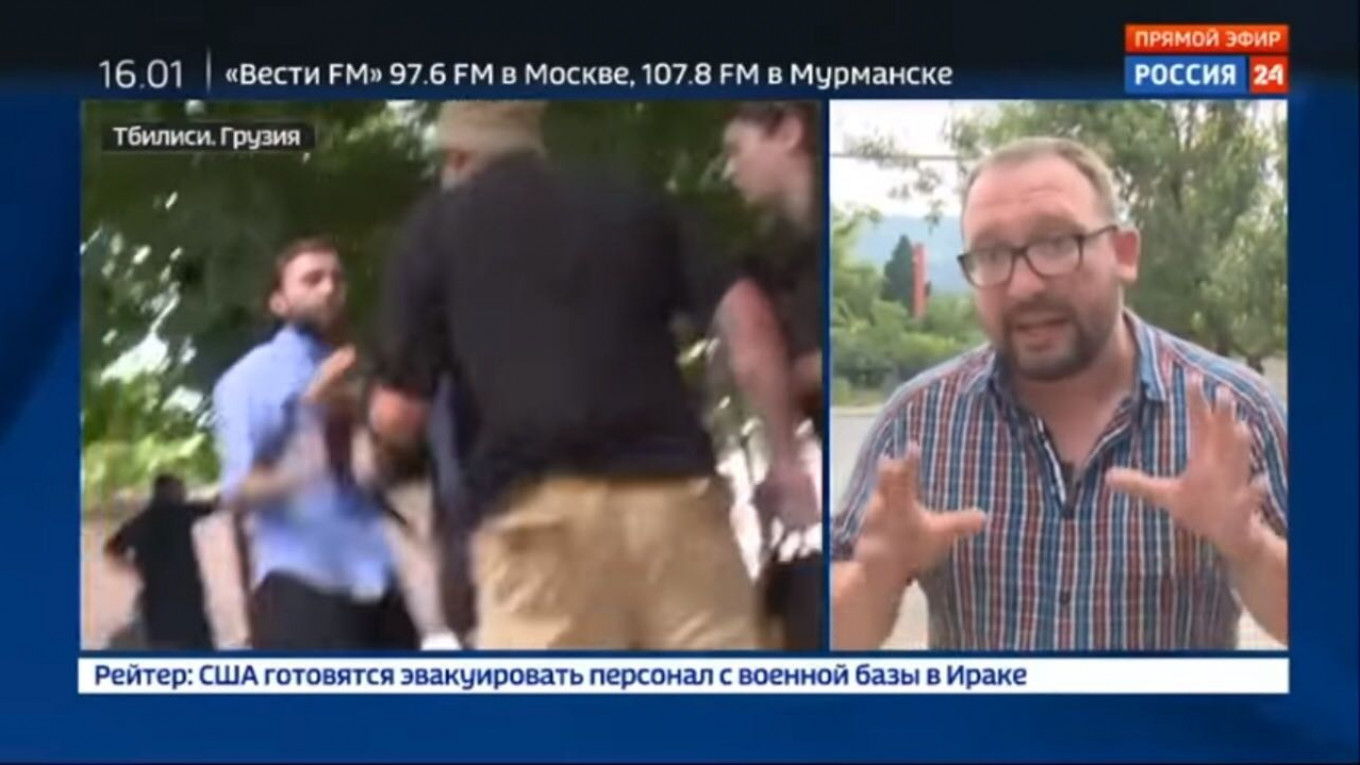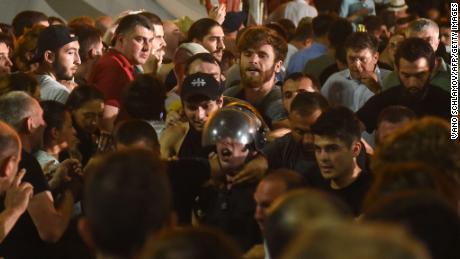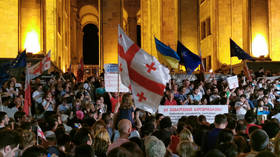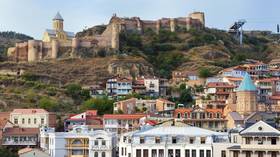https://www.themoscowtimes.com/2019...ed-in-georgia-amid-heightened-tensions-a66114
Russian TV Reporters Attacked in Georgia Amid Heightened Tensions – Reports
17 hours ago

The film crew of a Russian state-run television channel was attacked in Georgia’s capital on Saturday amid a flare-up in tensions between the two countries, Russian media have reported.
Tensions between Russia and Georgia were ignited after a Russian lawmaker’s speech in the Georgian parliament set off mass protests in Tbilisi on Thursday. Demonstrators violently clashed with police, resulting in more than 200 people injured, including foreign and local journalists.
Rossia 24 correspondent Stanislav Bernwald had been interviewing the owner of a travel agency in Tbilisi about President Vladimir Putin’s suspension of Russian flights to Georgia.
Video shows two men attempt to start a fight with Bernwald and his cameraman before the travel agency owner’s spouse steps in and tells the attackers to leave. The attackers spat in the film crew’s faces and shouted nationalist slogans, Bernwald said.
Later, a man can be seen kicking another man on the ground, but it’s not clear who the individuals are.
In a statement Saturday, Russia’s Foreign Ministry said that “aggressive-minded radical individuals” were behind the attack attempt and demanded that Georgian authorities ensure the safety of both Russian journalists and citizens in the country.
news
Putin Suspends Passenger Flights From Russia to Georgia
Read more
Putin on Friday banned Russian airlines from flying to Georgia and ordered the government to ensure the safe return of Russian citizens in the country. On Saturday, Russia also banned Georgian airlines from flying to Russia.
Russia and Georgia have not had full diplomatic relations since a 2008 war between the two countries.
https://www.bbc.com/news/world-europe-48727133
News BBC News Navigation
Sections
Russia suspends Georgia flights after violent clashes
- 22 June 2019
Media playback is unsupported on your device
President Vladimir Putin has temporarily banned Georgian airlines from flying to Russia amid rising tensions between the two countries.
On Thursday, some 240 people were injured in protests in Georgia. The protests were ignited by the appearance of a Russian MP in the country's parliament.
Mr Putin signed a decree on Friday suspending flights to Georgia by Russian airlines.
The suspensions will start from 8 July.
A transport statement on Saturday said the reason for the latest suspension was to "ensure a sufficient level of air security and arrears" owed by Georgian companies.
The Kremlin said the suspension on Russian airlines flying to Georgia was to "ensure Russia's national security and protect Russian nationals from criminal and other unlawful activities."
Tensions between the countries remain high, 11 years after they fought a war over the region of South Ossetia.
On Saturday, a news team from Russian state TV was attacked by two men on the street in the capital, Tbilisi. Nobody appeared to have been seriously hurt in the incident, which was captured on film.
What other action is Putin taking?
Mr Putin has ordered plans to be made to help bring back Russian citizens already in Georgia.
Moscow also recommended that Russian travel agencies suspend all tours to Georgia.
Several thousand Russian tourists are currently in Georgia, Russian tour agency representative Maia Lomidze told Russian media. According to Russian data, about half a million Russians have visited Georgia to date this year while 1.7 million Russian tourists went there last year.
"Tourism in Georgia is on the rise, and the decision has shocked the whole industry," Aleksan Mkrtchyan, who runs a chain of Russian travel agents, said in a statement.
"Georgians have traditionally treated Russians well," Irina Tyurina, a spokeswoman for the Russian Tourism Union, told AFP News agency.
Deep frustrations on show
Analysis by Rayhan Demytrie in Tbilisi
Protesters gathered again on Friday night outside the Georgian parliament building where they have been chanting "No to Russia" over and over again.
But they have motives that extend beyond denouncing Moscow. These demonstrators want the Georgian Interior Minister Giorgi Gakharia to resign over his handling of the unrest.
They are also angry at how the police dealt with Thursday's protests. Tear gas, rubber bullets and water cannon were used to push back the crowd in what were ugly scenes.
And on Friday, protesters came out in bigger numbers. It appears the visit of a Russian MP has unlocked much deeper frustrations with the current administration and the way it has handled relations with its northern neighbour.
What caused the protests?
Sergei Gavrilov, the Russian MP who sparked the fury, had addressed an assembly of MPs from Orthodox Christian nations on Thursday.
He had been taking part in the Interparliamentary Assembly on Orthodoxy (IAO) - a body set up by the Greek parliament in 1993 to foster relations between Christian Orthodox lawmakers.
Opposition MPs in Georgia's parliament called for protests after he delivered his speech in Russian from the Speaker's seat.
"That was a slap in the face of recent Georgian history," Elene Khoshtaria, an opposition member of parliament, said.
Thousands of protesters tried to storm the parliament, and police used rubber bullets and tear gas in an attempt to disperse them.
Some protesters carried EU flags and placards reading "Russia is an occupier".
Giga Bokeria, an opposition MP for the European Georgia party, told AFP news agency the rally outside parliament had been "a spontaneous protest by ordinary Georgians".
The Speaker of the parliament, Irakli Kobakhidze, resigned following the violence.
Georgian President Salome Zurabishvili called Russia "an enemy and occupier", saying Moscow had helped to stir the unrest.
The Kremlin condemned the protests as "Russophobic provocation", while Russia's foreign ministry accused Georgia's opposition of trying to prevent an improvement in bilateral relations.
Why are there tensions between Georgia and Russia?
When Georgia declared independence from the Soviet Union in 1991, separatist conflicts erupted in the regions of Abkhazia and South Ossetia.
In August 2008, Georgia attempted to recapture South Ossetia. Russia poured troops in, ousting Georgian forces and only halting their advance within striking distance of Tbilisi.
Following a ceasefire, Russia withdrew most of its troops from undisputed parts of Georgia but still maintains a military presence in South Ossetia and Abkhazia, recognising both as "independent" states.
- South Ossetia: Russia pushes roots deeper into Georgian land
- Abkhazia: The 'country' living in a Soviet time warp
However, bilateral trade and tourism had been growing in recent years.
https://eurasianet.org/putin-orders...georgia-after-anti-russia-protests-in-tbilisi


Nika Nasrashvili @nasrashvilin
https://twitter.com/nasrashvilin/status/1142406532002398209
After anti-Russia protest in #Tbilisi Putin temporarily banned flights to #Georgia and recommended travel agencies to stop selling tours. While RU tourists are very important for GEO industry it won't have long-term impact. It's not 2005-6 anymore. Geo industry grows without RU.
48
8:18 PM - Jun 22, 2019
30 people are talking about this
https://edition.cnn.com/2019/06/21/europe/putin-bans-flights-russia-georgia-intl/index.html
Putin halts Russian flights to Georgia
By George Kazarian and Simon Cullen, CNN
Updated 2053 GMT (0453 HKT) June 21, 2019

People rally outside the parliament in Tbilisi on June 20, 2019.
(CNN)Flights carrying Russians to nearby Georgia will be halted after anti-Russian protests flared in the former Soviet republic.
Russian President Vladimir Putin has issued a temporary flight ban to begin next month, state news agency TASS reported on Friday. It added that Putin has also ordered the repatriation of Russian citizens temporarily living in Georgia.
"Starting on July 8, 2019, Russian airlines are temporarily prohibited from carrying out air transportation (including commercial) of citizens from the territory of the Russian Federation to the territory of Georgia," TASS said.
The announcement comes after Thursday's large-scale demonstrations by Georgian protestors against a visit by Russian MP Sergey Gavrilov to the Georgian parliament in the capital city Tblisi. Georgia's president has since accused Russia of meddling in its internal affairs and stirring anger.
Georgia's president blames Russia over violent protests
Georgian President Salome Zourabichvili wrote on Facebook late Thursday: "Russia is our enemy and occupier. Today, the Fifth Column orchestrated by Russia might become more dangerous than open aggression."
On Friday, Moscow responded and expressed "extreme disapproval" of the protests, which it labeled a "Russophobic provocation."
"One certainly can't help being extremely concerned over the fact that there were aggressive outpourings directed at Russian citizens," Kremlin spokesman Dmitry Peskov told reporters in a conference call.
Georgia was part of the Soviet Union until 1991, and in recent years has struggled with tensions with Russia over Moscow's support for the breakaway Georgian regions of Abkhazia and South Ossetia.

2008 Georgia Russia Conflict Fast Facts
Gavrilov told the RIA-Novosti news agency that he believed Georgian protesters demanded his removal because of his alleged participation in the separatist conflict in Abkhazia in the early 1990s. A member of the Communist Party of the Russian Federation, Gavrilov has said he never participated in any armed conflicts.
Tensions flared between Russia and Georgia in August 2008 over a Russian-backed separatist movement in the province of South Ossetia, when then-Georgian President Mikheil Saakashvili sent troops to regain control over the self-proclaimed autonomous region. Russia responded at that time by moving tanks and soldiers farther into Georgian territory.
Reporting contributed by Nathan Hodge, Milena Veselinovic, Bianca Britton and Luka Gviniashvili




